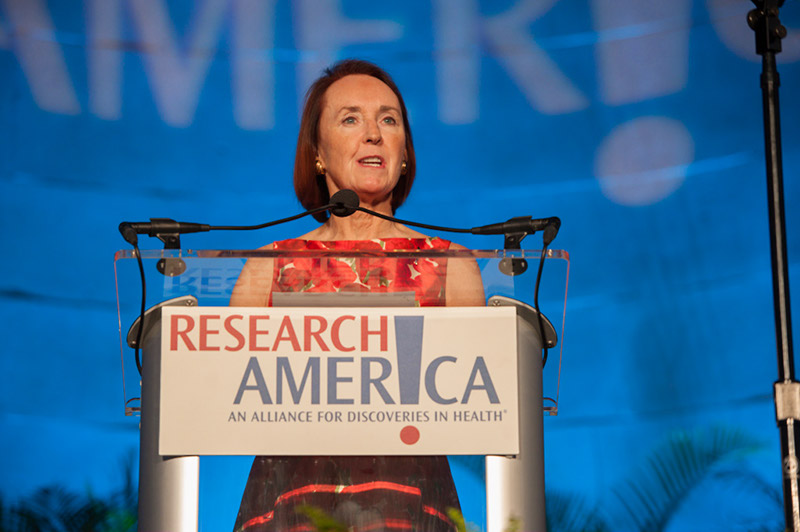Discipline and Staying Power

Dear Research Advocate,
I had the honor of joining past NIH Directors Harold Varmus and Francis Collins (currently serving as Science Advisor to the President) and other admirers in delivering a eulogy for the legendary John Edward Porter, former Congressman, Research!America Chair Emeritus, and my mentor and friend, at a celebration of his life. It’s not easy to stay disciplined when the odds seem especially long, and advocates grow weary, but John Porter always stayed the course – and that staying power won the day, again and again.
COVID-19 Is Not Over: Despite the compelling need for additional resources to power pandemic R&D and purchase additional testing, treatments, and vaccines, Congress has not made funding a priority and congressional action to assure needed preparedness and response continues to languish.
Our briefing paper provides an overview of the threat COVID-19 continues to pose to our society. An article in The Atlantic by Ben Mazer, MD, homes in on growing understanding of the debilitating, widespread effects of long COVID, underscoring the need to minimize the risk of long COVID, which means minimizing the spread of COVID. Which brings us full circle to the need for investment. Take a moment to use this editable email to make the case for supplemental COVID funding to your members of Congress.
Another Threat Calling for Research: More than 2,100 cases of monkeypox have been confirmed beyond Africa, across dozens of countries, including 99 cases in the U.S. (an increase of almost 20% in one day!). An expert panel last week – hosted by Yale School of Medicine – provided an important discussion of what is known, what we need to learn, and what actions need to be taken to get ahead of the virus. Stay tuned.
User Fee Legislation: On Tuesday, the Senate Health, Education, Labor, and Pensions Committee approved legislation reauthorizing user fee agreements for prescription drugs, medical devices, generic drugs, and biosimilars. The bill strengthens FDA oversight, enhances the accelerated approval process, and improves treatments for rare diseases, among other provisions. The House passed its version of the user fee reauthorization last week. Once the full Senate passes its version of the reauthorization bill, it must reconcile differences with the House bill and send it to the president for signature by September 30.
FY23 Appropriations: The House Agriculture Appropriations Subcommittee has marked up its FY23 Agriculture Appropriations legislation. The bill includes discretionary funding for the FDA, which is in addition to the user fees authorization discussed above. The Subcommittee allocated $3.65 billion in FY23 discretionary funding, an increase of $341 million over the FY22 level. The full Committee is scheduled to mark up the bill on June 23.
The House Labor-HHS Appropriations Subcommittee will mark up its FY23 bill on June 23, with the full Committee scheduled to consider the bill on June 30.
Hispanic Americans’ Views of Science: The Pew Research Center released the results of a survey of Hispanic Americans’ trust in and experiences with science. It notes Hispanic Americans are severely underrepresented in STEM jobs, representing 17% of the U.S. workforce but only 8% of the STEM workforce. There is a strong desire for more Hispanic American role models in STEM fields.
In a positive finding, about 8 in 10 Hispanic Americans say they have at least a fair amount of confidence in medical scientists to act in their best interest – higher than the confidence they express for any other group. This is the second in a series from Pew examining Black and Hispanic Americans’ views on science.
NIH Researcher Demographics: The NIH Office of Extramural Research released an update on its efforts to enhance the diversity of the biomedical workforce, of which funding (success) rates for principal investigators (PIs) is one indicator. Some progress has been made – the report shows growth in the funding rate of Black PIs on research project grants but acknowledges the need for more progress for Black and Hispanic PIs.
Research!America recently hosted an off-the-record roundtable discussion with key officials at NIH and others to discuss current progress and the path forward. Two prominent themes: change is not happening as fast as it can, and incremental change is important but insufficient. Several participants asserted that the system itself is the issue. That’s a big statement. Let us know your thoughts by contacting Research!America’s Dr. Louis Sullivan Science Policy Fellow Jasmine George.
Upcoming Alliance Discussions: Join us on Wednesday, June 22, at 2 p.m. ET for a discussion with Patroski J. Lawson, CEO of KPM Group DC, about his work in mental health advocacy and the importance of equal access to mental health care.
Stay well, stay safe, and stay connected.
Mary Woolley




